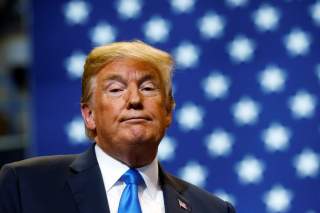Where are Trump and Mueller Headed?
Jacob Heilbrunn and Daniel McCarthy discuss Trump, Mueller and the New York Times.
Editor's Note: In our latest Facebook Live interview (please like our Facebook page to see more of these events) Jacob Heilbrunn, editor of the National Interest, and Daniel McCarthy, editor of the journal Modern Age, discuss the latest events in the Trump administration.
Daniel McCarthy recently wrote an article on Trump and Russia. An excerpt of the article can be found below:
Donald Trump has the magic touch. After eighteen months in office, and eighteen more before that as the pre-eminent figure in American politics, Trump’s shock value might have worn off. The political establishment might have become inured to his heresies about cherished policies and sacred institutions, even to the point of learning to control its own response to his provocations. But hell no!—Trump can still do it. He can goad his enemies into saying even crazier things than he does, with the difference that what Trump says speaks to the national psyche, or at least the Republican subconscious. What the defenders of politics past have to say speaks only to a consensus that evaporated when no one was looking.
President Trump does not care what the U.S. intelligence community thinks about Russia. He advertised that fact in his Monday press conference with Vladimir Putin. Dan Coats, the director of national intelligence, says one thing about Russian meddling in the 2016 election. Putin says another. Trump shrugs—metaphorically, if not in fact—and asks himself aloud: why would the Russians do it? A day later, in the face of the fury, Trump amends his statement in the most brazenly casual way possible: oh, did he say “would?” He meant “wouldn’t.” Why wouldn’t the Russians interfere?
The correction, if you can call it that, like the original statement, flags up exactly how Trump feels about his critics, the intelligence world, and investigations into Russian interference, including the possibility of collusion between Trump associates and the Kremlin. He left nothing equivocal on that last point—Trump forcefully denied any collusion with Russia and instead asked what ever became of the server on which the hacked DNC information resided. All of this—from the press remarks to his retroactive reversal to his subsequent assertion, once back in the United States, that Russia is not interfering in the 2018 midterms—may not have been premeditated to provoke his critics (and fair-weather allies) to apoplexy, but could not have been better chosen to do so if it had been planned. John Brennan, director of the CIA under Obama, took to Twitter to proclaim Trump’s words not only impeachable but “nothing short of treasonous.” Others piled on, with the grand prize in histrionics going to former Watergate prosecutor Jill Wine-Banks, whose hyperbole took bad taste and ahistorical fatuity to hitherto unimagined extremes: “It’s just as serious to me as the Cuban missile crisis in terms of an attack or the 9/11 attack,” she told MSNBC, “I would say that his performance today will live in infamy as much as the Pearl Harbor attack or Kristallnacht.”
Image: Reuters

